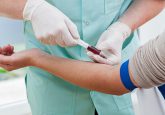Research partnership develops bioactive paper

Simple paper-based diagnostic assay for the quantification of bronchitis-indicating protein.
A point-of-care bioactive paper for the measurement of bronchitis in patients with airway diseases, such as asthma, COPD and chronic cough is being developed by a pair of University researchers. This development is funded by a $US 600,000 Canadian Institutes of Health Research (CIHR) award. The paper will be designed to measure the quantity of a protein called eosinophil peroxidase (EPX) in sputum.
Parameswaran Nair, associate professor of Medicine and CIHR Canada Research Chair in Airway Inflammometry, explained the assay development, “We are developing a point-of-care diagnostic test using a bioactive, paper-based detection of EPX. This test has the potential of a global application in both resource-poor and resource-rich countries in doctor’s offices, outpatient clinics, and by patients themselves for self-management.”
Nair will be working alongside John Brennan in this project, who is a Canada Research Chair in Bioanalytical Chemistry, and director of McMaster University’s (ON, Canada) new BioInterfaces Institute. The research partnership is supported by AllerGen NCE, a national network for asthma and allergic diseases research, which is based at McMaster University.
It is known that 50% of asthma exacerbations and one-third of COPD exacerbations are caused by eosinophilic bronchitis (associated with allergies). Bronchitis is not usually measured during current management strategies, focusing instead on airflow and symptoms that are often inaccurate. Quantitative EPX cell count-based treatments provide better outcomes but are not currently widely available and are not accessible in real time.
Aiming to find a solution to this inaccessibility, Nair developed a sputim filtration device (Accufilter) alongside the late Freddy Hargreave and Ann Efthimiadis. In addition, Nair collaborated with Jamie Lee at the Mayo Clinic (MN, USA) to develop a tool for measurement of EPX in sputum.
Nair and his research team now hope to transform this tool into a low-cost diagnostic in the form of a paper-based strip. Nair commented on the new technology, “Our goal is to pave the way for a frugal treatment strategy whereby patients will be able to self-adjust the dose of their corticosteroids based on their sputum eosinophil levels as detected by the EPX assay. We can see applications of this technology worldwide.”
Source: Bioactive paper will revolutionize point-of-care diagnostics.





